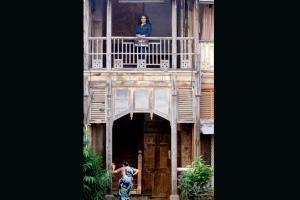Sunday mid-day writer Jane Borges' first book is real, and then, not. Setting it in the once-illustrious Goan neighbourhood she continues to live in, she makes a Michael out of Menezes to ask, why did Mumbai forget Cavel?

Jane Borges writes of Cavel, once a Latin quarter that was home to Portuguese missionaries, later overrun with East Indians, and home to the Goans since the 19th century. Pic/ Atul Kamble
Home is a place of refuge. It offers the comfort of family and friends, and great neighbours. If you are a Catholic from Cavel, the small Christian neighbourhood of South Mumbai, the church also finds its way into this list.
ADVERTISEMENT
That's how I arrived at multiple definitions of home, when I moved here in 2003.
In the beginning, I thought little of an area locked by the teeming markets of Chira Bazaar, Bhuleshwar and Kalbadevi. The Church of Our Lady of Health, situated at the far end of Dr Viegas Street, and named after Dr Acacio Gabriel Viegas who rescued Bombay during the Bubonic Plague of 1897, had barely 300 parishioners.
It was years later, when a research project took me to the Asiatic Library, that I first stumbled upon Cavel in the yellowing pages of a hardbound book by Goan historian and physician José Gerson da Cunha (1844-1900). Cavel, he said, got its name from the Kolvars or the Kolis.
From his work, and later, that of historian Teresa Albuquerque, I had to learn of how this Latin quarter had experienced three lives in a few hundred years. Once home to the Portuguese missionaries—the church used to be the private chapel of a Portuguese gentleman Pedro Jose de Moura—the place soon came to be overrun with native Christians, today known as the East Indians. By the turn of 19th century, the Goans migrated to the port city for better opportunities, settling down in Christian pockets; Cavel was the new address away from home, not just for Da Cunha, but for Salvador Patricio de Souza, who ran the famed Padaria de Cavel back in the 1800s. The bakery distributed bread to all and sundry in the city, until it shuttered. Cavel would see many glowing names in the mid-1900s. It gave the city three mayors—Dr Joseph Collaco, Dr Joseph Alban D'Souza and Dr Joseph Leon D'Souza. They lived on different floors of 183-A Pius X Mansion, a century-old building that still stands. It's most likely that Dr Viegas too, had a connection with this place.
This, indeed, was a neighbourhood with a rich legacy. And the more I delved in, the more there was to find. Why then, did Mumbai forget Cavel? There is no real answer to this question. For a shrinking community, there are bigger problems at hand than preserving history.
That's why I wrote Bombay Balchão (Westland).
It allowed me to re-imagine Cavel, one that resembled the glorious place of yore, and drew inspiration from its treasure-trove of stories. But instead of Dr Viegas, I introduced Dr D'Lima, a fictional contemporary, after whom I named the street that would lead to my Cavel.
I refrained from telling the real stories because memories in Cavel are now fractured. Everyone seems to know a story, but a different one. Many years ago, my late neighbour Lulu Days mentioned how her brother-in-law, Arnold Days, a firefighter, died in the 1944 Bombay Port explosion. He was not supposed to be at work that day. It was the saddest day in Cavel. Arnold inspired David Lawrence, a character in my book.
My protagonist, Michael Coutinho, is a work of imagination. But former veteran journalist Ervell E Menezes, a resident of D'Monte Building, had shared an amusing incident once, of how he was forced to grow a beard as a decoy to keep away a bunch of goons, who he had written about. He wore that beard till he passed away last year. So does Michael.
Vivienne Gaudet, a former hockey player for India, now based out of Canada, was kind enough to lend me a memoir she had written for her son. It had tales of celebration—the baan dance and rock bands—love and camaraderie in Cavel, all of which helped me place my characters in a world that was close to real.
Every chapter in this book is fiction, and I wouldn't have wanted it any other way. But it's still Cavel, like the one everyone forgot to remember.
Catch up on all the latest Mumbai news, crime news, current affairs, and also a complete guide on Mumbai from food to things to do and events across the city here. Also download the new mid-day Android and iOS apps to get latest updates
 Subscribe today by clicking the link and stay updated with the latest news!" Click here!
Subscribe today by clicking the link and stay updated with the latest news!" Click here!






